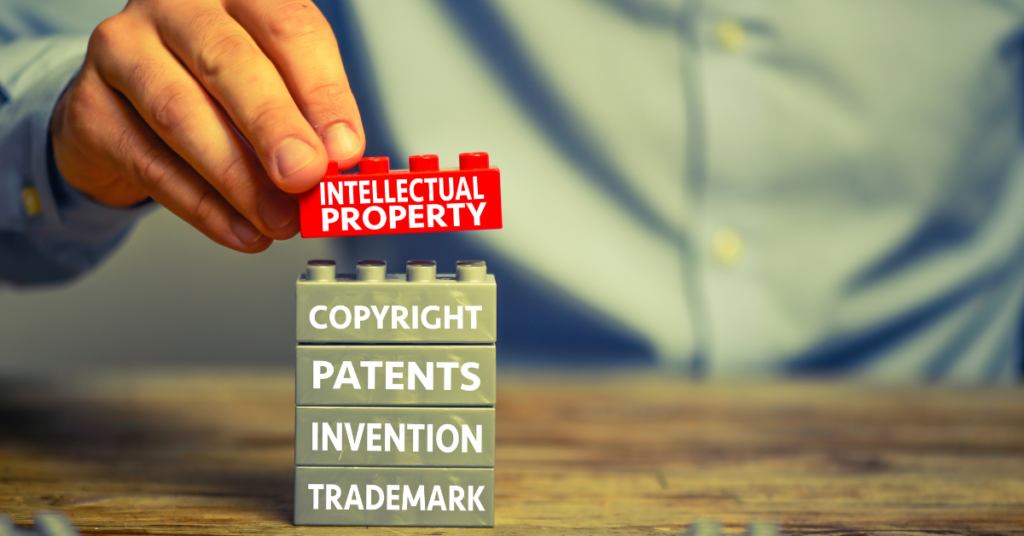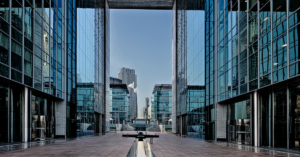Last updated on: 12th March, 2025
Intellectual property (IP) refers to creations of the mind. Examples include inventions, literary and artistic works, designs, symbols, names, and images used in commerce. Protecting intellectual property fosters innovation, creativity, and economic growth. So creators can reap the benefits of their inventions and creations.
In the UAE, Intellectual Property Law plays a significant role in promoting a strong business environment and safeguarding the rights of innovators and businesses alike. This guide dives into the intricacies of Intellectual Property Law in the UAE, providing a comprehensive overview of the legal frameworks governing trademarks, patents, copyrights, and industrial designs.
We’ll also explore the registration procedures, the protections afforded to IP owners, and the enforcement mechanisms in place to fight infringement. If you’re an entrepreneur, a business owner, or a creative professional, you must understand the UAE’s IP laws to protect your intellectual assets and maintain a competitive edge in the market.
What is Intellectual Property Law in the UAE?
Intellectual property is the creative work of the human intellect. Management of Intellectual Property Rights has assumed great significance in the present-day economy. Different types of Intellectual Property Rights are governed by separate laws, such as copyright, trademarks, industrial designs, patents, etc.
Trademark
Trademark registration protects the public from confusion and deception by identifying genuine goods. It also prevents other business firms from using the brand name in the same or similar fashion and thus discourages others from cashing in on the business’s well-built goodwill.
Patent
Patents enable inventors to profit from their creations and contribute to the technological development of the country.
Copyright
Copyright gives statutory expression to the economic rights of creators.
Industrial Design
Industrial design encourages creativity in the industrial and manufacturing sectors and adds commercial value to a product.
Importance of IP Protection
Intellectual property plays a vital role in the economy, and its protection is essential due to the following reasons:
– To create a sense of security among creators
– To reward and encourage creativity through incentives.
– To encourage technological innovations.
– To encourage fair trading, which would contribute to economic and social development.
Legal Framework for IP in the UAE
Federal Law No. 36 of 2021 on Trademarks
Federal Law No. 36 of 2021 (UAE Trademark Law) aims to provide an integrated protection for trademarks. The UAE Trademark Law contains a range of provisions dealing with the trademark registration process, trademark protection period and renewal, assignment, transfer and licensing, collective trademarks, etc.
Federal Law No. 11 of 2021 on the Regulation and Protection Of Industrial Property Rights
Federal Law no. 11 of 2021 (UAE Industrial Property Law) covers patents, industrial designs, integrated circuits, undisclosed information, and utility models registered in the UAE, including the free zone. The Law aims to protect industrial property and regulate the procedures for its registration, use, exploitation, and assignment.
Federal Decree-Law No. 38/2021 on Copyrights and Neighboring Rights
The UAE has robust copyright laws that automatically protect various creative works. Federal Decree-Law No. 38/2021 (UAE Copyright Law) protects authors’ rights, i.e., intellectual property creators in the form of literary, musical, dramatic, and artistic works. The UAE Copyright Law grants both economic and moral rights to the authors.
Trademarks in the UAE
Trademark means any name, label, word, symbol, or logo that distinguishes the product or services of one person from those of others.
As per UAE Trademark Law, a trademark can be a distinctive shape of names, words, signatures, letters, symbols, numbers, addresses, seals, drawings, pictures, engravings, packaging, graphic elements, forms, colours, a sign or a group of signs, including three-dimensional marks, hologram marks. A distinctive sound or smell may also be considered a trademark.
The Law further outlines several exceptions that can’t be considered trademarks, such as marks lacking distinctiveness, breaching public morals, containing religious symbols, being identical or similar to well-known trademarks owned by others, and containing misleading or false information.
Process of Trademark Registration
Individuals and entities can apply to the Ministry of Economy (Ministry) for trademark registration. The Ministry is required to decide on the registration application within 90 days of its filing. A trademark may be registered for one or more categories.
Requirements and Documentation
The trademark owner shall submit the trademark registration application, if it has a domicile in UAE or by an agent registered into a special register of trademarks registration agents. The registration application for the trademark should include the following documents:
1- Copy of the trademark to be registered.
2- The applicant’s Name, address, nationality, and profession. If the applicant is an artificial person, its name, address of headquarters, and nationality must be mentioned.
3- Name, data, and address of the registered agent, so long as the application is submitted by a registered registration agent.
4- Accurate description of the trademark to be registered.
5- Commodities or services for which a trademark is to be registered and their class.
6- Any other data determined by the Ministry
Duration and Renewal of Trademarks
The period of protection resulting from trademark registration is (10) ten years, starting from the date of filing the application. If the trademark right holder wishes to renew the protection for similar periods, he may apply to renew the trademark registration with the Ministry within the last year of the protection period and for six (6) months following payment of the prescribed fee.
Infringement and Enforcement
Infringement occurs when a person or entity who is not a registered owner uses a mark that is the same as or similar to a registered trademark. The owner of a registered trademark may commence legal proceedings for trademark infringement to prevent unauthorised use of that trademark.
The UAE Trademark Law imposes the following penalties in case of trademark infringement:
(i) Imprisonment and/or a fine of no less than AED 100,000 and not more than AED 1,000,000 shall be imposed on whoever:
a- Forges a registered trademark or counterfeits a trademark in a way that confuses the public;
b- Knowingly uses a forged or counterfeit trademark for commercial purposes;
c- Puts on his goods or uses in respect of the services he provides, in bad faith, a trademark owned by others.
d- Possesses tools or materials with the intent of using them to forge or counterfeit registered or well-known trademarks.
e- Knowingly imports or exports goods bearing a forged or counterfeit trademark.
(ii) Imprisonment of not exceeding one year and a fine of not less than AED 50,000 and not more than AED 200,000 shall be imposed on whoever:
a- Sells or offers for sale or circulation or possesses with the intention of selling goods or offers the provision of services carrying a forged, imitated, or unlawfully put or used trademark, despite his knowledge thereof.
b- Unlawfully uses a non-registrable mark on his commercial papers and documents, goods, or services in a way that would lead to the belief that the trademark has been registered.
Patents in the UAE
A patent is granted for a new invention resulting from an innovative idea or improvement, which involves an inventive step and is susceptible to industrial application, such as new computer software or medical equipment. The UAE Patent Law requires an invention to be new, inventive, and capable of industrial application.
– An invention shall be considered new if it is not preceded by any earlier technology previously disclosed to the public in writing or orally, through use, or by any other means which have made such invention known before the date of filing the patent application.
– Inventive means that the invention must not be the obvious or natural suggestion of what was previously known.
– An invention is considered to have an industrial application if it can be manufactured or used in any field.
Process of Patent Registration
A patent application is to be submitted to the Ministry by the inventor, registration agent, or assignee of the invention. The application shall include the names of the applicant, inventor, and registration agent (if any), as well as the name, summary, and detailed description of the invention.
Requirements and Documentation
The applicant shall provide a description of the invention in a manner sufficient to identify the subject matter of the invention on the filing date, such as an explanation of the technical field to which the invention relates, details of the industrial application of the invention, etc.
An application for a Patent shall contain the following information:
a- The title of the invention.
b- The name and address of the applicant.
c- The name and address of the inventor.
d- The legal representative and his address, if any.
e- An abstract of the invention, not exceeding (500) five hundred words.
f- The international application number and filing date if the application is in the national filing phase in the country for international filing under the Patent Cooperation Treaty in accordance with the Patent Cooperation Treaty.
g- The original application’s number and filing date if the application is divisional or a conversion of the previous application filed in UAE.
h- The number and date of the prior-filed application and the office that received it if the applicant claims a right of priority based on the Paris Convention for the Protection of Industrial Property.
Duration and Renewal of Patents
A Patent is valid for twenty (20) years from the date of application submission.
Infringement and Enforcement
A patent holder is granted the right to exploit the invention, including activities such as use, sale, offering for sale, and import. A patent holder has the right to claim damages and compensation for infringement.
Penalties may include fines ranging from AED 100,000 to AED 1,000,000, as well as imprisonment. Furthermore, the court may issue orders for confiscation, destruction, or removal of infringing items and equipment used in the infringement.
Copyrights in the UAE
Copyright protects artistic and creative works such as literature, music, theatre, architecture, etc. It enables the creator/author of an original work to control the use of their work and prevent plagiarism. It also gives the author the exclusive right to make copies of its original work.
The UAE Copyright Law protects the following intellectual works:
a- Books, booklets, articles, and other literature
b- Computer software and applications, databases, and similar works
c- Lectures, speeches, sermons, and other works of similar nature
d- Plays, musicals and pantomimes
e- Musicals accompanied by dialogues and musicals that are not accompanied by dialogue
f- Audio and video works or audio-visual works
g- Architectural work and architectural plans and drawings
h- Drawings, paintings, sculptures, etchings, lithography, screen printing, reliefs and intaglio prints, and other similar works of fine art
i- Photographic work and the likes
j- Works of applied art and plastic art
k- Charts, maps, plans, 3-D modelling for geographical and topographical applications, architectural designs, etc.
l- Derivative works, subject to the protection afforded to the works upon which they are based.
It should be noted that UAE Copyright Law does not protect ideas, procedures, working methods, mathematical concepts, official documents, news and reports on current incidents and events of a purely informative nature and public domain works.
Rights Granted by UAE Copyright Law
The UAE Copyright Law grants the following rights:
Economic Rights
Economic rights enable authors to exploit their works commercially. UAE Copyright Law grants exclusive rights to authors to reproduce (including downloading or electronic storage), broadcast, re-broadcast, publicly perform or communicate, translate, assimilate, modify, rent, lend, or publish their works (including making it available through computers, data or communication networks or any other means).
An author or his successor may transfer or licence all or some of his economic rights to a third party. Such a transfer is valid only if it is made in writing and specifies the transferred right, mentioning the object of such transfer, duration, and place of use.
The author or his successor may receive remuneration in cash or in kind in exchange for transferring any economic rights to a third party. Such consideration can be in the form of a share in the revenue resulting from the utilisation of those rights, on a lump sum basis, or a combination of both.
Moral Rights
UAE Copyright law grants certain moral rights to authors, such as the right to decide the first publication, the right to prohibit any modification of the work, the right to withdraw the work from circulation, and paternal rights, i.e., the right to claim authorship of the work.
Process of Copyright Registration
It is a prevalent misconception that copyright registration is mandatory for the author/owner to be entitled to protection under the UAE Copyright Law. This is incorrect.
Under UAE Copyright Law, copyright registration is not mandatory. Copyright originates as soon as an original work is created and automatically belongs to the owner, even if it is not registered.
However, it is highly advisable to formally register a copyright because it can serve as evidence of ownership of the work should there be any infringement dispute in the future
Requirements and Documentation
Applications for registering the work shall be filed on the Ministry’s website, with payment of the prescribed fees. The application shall contain the following data and information:
a- The title, type, description, and language of the work.
b- The name, nationality, capacity, and address of the applicant and a copy of the power of attorney duly certified and authenticated.
c- The author’s name, pseudonym (if any), nationality, address, and date of death (if applicable).
d- The name of the entity that directed the work (if any), its address, and the document supporting the relationship between it and the author.
e- The name and address of the publisher, the date and place of the first publication, and the international number (if any).
f- The transferee’s name, nationality, address, type of transfer, duration and geographical scope, and document that proves the transfer by the author or the right holder.
g- Data and details of the work.
h- A copy of the passport or identity card of each applicant, author, and transferee.
i- A copy of the work according to the nature of the work.
j- Any other documents or data that the Ministry requests and instructs the applicant to submit as it deems necessary to verify the fulfilment of the necessary conditions for accepting his application, pursuant to a written notice served thereto to this effect.
Duration and Renewal of Copyrights
The economic rights of an author are protected for the duration of his life plus 50 years starting from the first day of the calendar year following his death.
Infringement and Enforcement
The copyright in a work is infringed if it is published or displayed without its owner’s consent. In case of infringement, an author can request the authorities to take the following measures:
(1) Stopping the publication, display, or production of the work;
(2) Provisional seizure of the copies of work;
(3) Provisional seizure of the revenue resulting from publication or display;
(4) Evidencing public performance of the work and preventing the ongoing display.
The UAE Copyright Law also provides for the formation of a grievance committee to consider disputes and grievances related to the author’s copyrights.
Industrial Designs in the UAE
An industrial design is any ornamental or aesthetic three-dimensional or two-dimensional composition that provides a specific design to be used as an industrial or artisanal product.
An industrial design should be (i) novel, i.e., it should not have been disclosed to the public by publication or by use or in any other way before the filing date of the application (ii) it should not violate public order or morals.
Requirements and Documentation
The industrial design registration application shall include the following information and documents:
a- The title of the design.
b- The name and address of the applicant.
c- The name and address of the designer.
d- The agent, if any, and his address.
e- The distinctive feature of the design that identifies the elements to which the design is applied.
f- The number and filing of the original application if the application is a division of the original application.
g- The number of the prior-filed application, the date of its filing, and the name of the office to which the previous application was submitted if the applicant is claiming priority based on the Paris Agreement.
Duration and Renewal of Industrial Designs
The term of protection of an industrial design is twenty (20) years, starting from the filing date of the application for protection.
Infringement and Enforcement
The protection provided under industrial design grants its owner the right to prevent third parties from performing any of the following acts:
a. Using industrial design in the making of any product.
b. Importing any product related to the Industrial Design or possessing such product for the purposes of commercial use, offering it for sale or selling it.
In case of infringement, the right holder can claim damages and compensation. Penalties may include fines ranging from AED 100,000 to AED 1,000,000 and imprisonment. Furthermore, the court may issue orders for confiscation, destruction, or removal of infringing items and equipment used in the infringement.
Challenges and Considerations
IP owners in the UAE often face challenges such as navigating complex registration processes, dealing with potential infringements, and staying updated with evolving laws and regulations.
Protecting IP rights requires diligent monitoring, timely renewals, and proactive enforcement measures. To overcome these challenges, engage with experienced legal advisors and IP experts who can provide valuable guidance on registration, compliance, and litigation strategies.
Legal professionals like SK Legal Consultants can also assist in developing comprehensive IP protection plans, ensuring that intellectual property remains secure and enforceable in a competitive market.
Final Words
Intellectual Property Law in the UAE is vital for fostering innovation, creativity, and economic growth. Protecting intellectual property ensures that creators and businesses can fully benefit from their work, maintaining a competitive edge in the market.
Individuals and organisations must prioritise IP protection by understanding the legal frameworks and leveraging the expertise of legal advisors. By doing so, they can safeguard their intellectual assets, contribute to the dynamic business environment in the UAE, and drive future innovation and development.
Get Expert Legal Guidance with SK Legal on Intellectual Property Law in the UAE
Handling the complexities of intellectual property law requires more than just knowledge; it demands experience, expertise, and a deep understanding of the local legal landscape. At SK Legal, we provide comprehensive legal consultancy for all your IP needs, ensuring your creations and innovations are fully protected. Our services include:
- Comprehensive Legal Consultancy: Whether you’re registering trademarks, patents, copyrights, or industrial designs, our expert legal team is equipped to provide you with the best legal advice tailored to your unique situation.
- Support During Negotiations: Our legal advisory services extend to assisting clients during crucial negotiations, ensuring your intellectual property rights are always protected and enforced effectively.
- Collaboration with Local Law Firms: We understand the nuances of local jurisdictions. We collaborate with licensed local law firms to oversee IP-related court cases, especially in Dubai and Sharjah courts.
For personalised assistance and advice, contact us at [email protected]. Protect your intellectual property with confidence and expertise.
FAQs on Intellectual Property Laws in the UAE
UAE intellectual property law encompasses the legal frameworks and regulations designed to protect creations of the mind, such as inventions, literary and artistic works, designs, symbols, and names used in commerce. The primary laws include the UAE Patent Law, UAE Trademark Law, UAE Copyright Law, and the Industrial Design Law, all aimed at safeguarding the rights of creators and promoting innovation.
Protecting intellectual property in the UAE involves registering your IP assets with the relevant authorities. For trademarks and patents, this means applying through the Ministry of Economy. Copyrights are automatically protected upon creation but can also be registered for added security. It’s crucial to monitor the market for potential infringements and take legal action when necessary. Consulting with IP experts and legal advisors can provide tailored strategies for effective protection.
The Dubai International Financial Centre (DIFC) has its own set of intellectual property laws that align with international standards. The DIFC Intellectual Property Law covers patents, trademarks, copyrights, and industrial designs, providing a comprehensive legal framework for protecting IP within the DIFC jurisdiction. The DIFC Authority oversees the enforcement and registration processes.
The UAE Trademark Law governs the registration, protection, and enforcement of trademarks in the UAE. It requires businesses to register their trademarks with the Ministry of Economy to gain exclusive rights and legal protection. The law covers the use of distinctive signs, symbols, names, and logos to identify and differentiate goods and services in the marketplace. It also outlines the procedures for addressing trademark infringement.
Examples of intellectual property law include:
- Patent Law: Protects new inventions and grants exclusive rights to inventors.
- Trademark Law: Protects brand names, logos, and symbols used to distinguish goods and services.
- Copyright Law: Protects original literary, artistic, and musical works.
- Industrial Design Law: Protects the aesthetic design and appearance of products.
The illegal use of intellectual property, also known as IP infringement, occurs when someone uses, produces, or sells protected IP without the owner’s permission. This includes counterfeiting trademarks, pirating copyrighted materials, and manufacturing patented inventions without authorization. Such activities can result in legal actions, including fines and penalties, and damages to the IP owner’s business and reputation.
Article 43 of the UAE Copyright Law outlines the penalties for copyright infringement. It stipulates that individuals who violate the copyright of a work can face imprisonment and/or fines. The specific penalties depend on the severity and nature of the infringement, emphasizing the UAE’s commitment to protecting authors’ rights and deterring unauthorized use of copyrighted materials.
Disclaimer
This publication does not provide any legal advice and it is for information purposes only. You should not rely upon the material or information in this publication as a basis for making any business, legal or other decisions. Therefore, any reliance on such material is strictly at your own risk.
Share This Post On:
Sameer A Khan
Related Posts
Let SK Legal be your trusted partner in Intellectual Property Law in the UAE
Don’t navigate these challenges alone. For personalised assistance and advice on construction dispute resolution in the UAE, contact us at [email protected].
CONTRIBUTOR

Sameer Khan is one of the Best Legal Consultants in UAE, and Founder and Managing Partner of SK Legal. He has been based in UAE for the past 14 years. During this time, he has successfully provided legal services to several prominent companies and private clients and has advised and represented them on a variety of projects in the UAE.
View all posts





